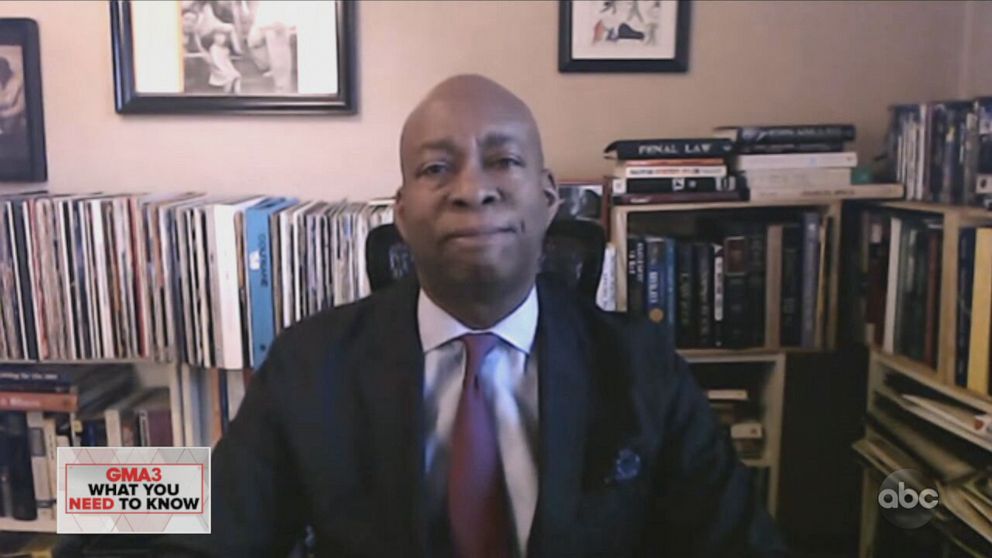[ad_1]
A retired top New York City detective is recommending “throwing out the book” on training for would-be police officers across the country and starting from scratch.
Kirk Burkhalter, who is now a professor at New York Law School, told ABC News on Tuesday that the training of police recruits has seen little progress in recent decades, and suggested that police should undergo at least two years of training and education before they are given a gun and sent out into the streets.
“This needs to move forward into the 21st century,” Burkhalter said on ABC’s “GMA3” show. “Pretty much, I would recommend throwing out the book and starting over. This training should be akin to an undergraduate degree and some form of police science.”
In recent weeks, police training in the United States has come under intense scrutiny following the killing of George Floyd, a Black Minneapolis man who died after a veteran police officer was caught on one citizen’s cellphone video kneeling on his neck as he repeatedly pleaded, “I can’t breathe.” Floyd’s death was followed by the June 12 killing of Rayshard Brooks in Atlanta by a police officer who allegedly violated numerous police policies and practices in the deadly confrontation, including shooting a fleeing suspect in the back.
The two officers directly involved the deaths of Floyd and Brooks have been fired from their respective police departments and charged with murder. Four other officers involved in the two cases, including two rookies who assisted in the arrest of Floyd, have also been criminally charged, and three have been terminated from their jobs.
“All the training and education in the world isn’t going to change someone’s heart and mind,” said Burkhalter, who served 20 years with the NYPD before retiring as a detective first grade, specifically referring to the behavior of the officers in Floyd’s case.
But Burkhalter said that if officers were given a substantially longer period of education and evaluation, “I do believe that we are more likely to catch those folks who are probably not suitable for this profession.”
In the United States, the average police academy class lasts 21 weeks, according to the U.S. Department of Justice (DOJ).
The Police Executive Research Forum, or PERF, a policy organization comprised of law enforcement executives from the nation’s largest cities and counties, conducted a survey of U.S. police academies in 2015 and found that recruits were given only about eight hours of training on each of the topics of de-escalation, crisis intervention, use-of-force policy and the use of electronic control weapons, specifically stun guns.
Meanwhile, recruits spent 58 hours on firearms training and another 49 hours on defensive tactics, the bulk of which was state-mandated. The DOJ, in a 2013 report, found a similar breakdown: Of the average 840 hours spent on police training, 21 hours were spent on the use of force.
“When we talk about the education factor alone, I would recommend those police officers, or potential police officers, take courses in psychology, interpersonal psychology, small group psychology, sociology, anthropology, world history, American history, dispute resolution, negotiation, counseling and interviewing and so forth,” Burkhalter said. “If you think about that curriculum, it would take quite some time in order to master it.”
He said police officers graduating from academies should also be well-versed in Constitutional law, have an understanding of the Bill of Rights and an understanding of “what it means that every individual has certain individual rights that are granted to them under the Constitution.”
“I think that would be wildly helpful, also,” Burkhalter said.
Other experts on policing in America have raised questions about the training U.S. police officers receive.
As part of an ABC News investigation last year on police de-escalation training, Maria “Maki” Haberfield, a professor of police science at John Jay College of Criminal Justice in New York, said, “We have the shortest training in comparison to any democratic country. ”
She said some Scandinavian countries, including Finland and Sweden, require recruits to go to a four-year police university before they are assigned to departments.
“Most departments are satisfied with a GED or a high school diploma,” Haberfeld told ABC News. “We have people who are trained in a very short, basic way that does not give them a fraction of the tools that they would need to have to police in a professional way. To me, it’s irresponsible in a democratic society not to give police officers four years at a university.”
Burkhalter said training programs in police academies have seen little progress between when his father became a police officer in 1962 and when he himself became a police officer in the mid-1980s.
“Our training was rather similar. And I would suspect that training that police officers receive today is somewhat similar,” he said. “So, this hasn’t progressed.”
[ad_2]
Source link

